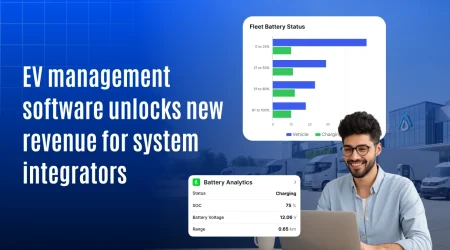Fleet Management Innovations in the Shipping Industries of Singapore

Singapore remains one of the world’s busiest maritime hubs, handling over 41 million TEUs in 2024 and maintaining connections to more than 600 ports globally. As shipping activity scales up, operational challenges also increase. From rising fuel costs to stricter IMO 2023 carbon rules and growing pressure for on-time deliveries, fleets face more complexity than ever.
To stay ahead, shipping companies in Singapore are adopting smart, data-driven fleet management solutions. Technologies like AI-powered route planning, IoT-based vessel monitoring, predictive maintenance, and blockchain tracking are transforming fleet operations. They help operators cut costs, improve safety, and stay compliant with evolving industry standards.
Key innovations in fleet management
-
Telematics systems
Real-time tracking improves visibility of vessel location, speed, and fuel use. A Singapore-based operator cut fuel costs by 12% and improved route efficiency with GPS telematics. -
Predictive maintenance
AI forecasts repair needs before breakdowns, reducing downtime and extending equipment life. One fleet saw a 30% drop in unexpected downtime. -
Autonomous vessels
AI-driven navigation enhances safety, reduces human error, and lowers labor costs. Early trials show strong potential for safer, more efficient operations. -
Blockchain
In addition blockchain secures cargo and documentation records. A logistics provider used it to eliminate fraud and accelerate customs clearance. -
IoT devices
Sensors track engine health, fuel usage, and environmental metrics. They provide real-time insights that improve efficiency, compliance, and sustainability.
Benefits of fleet management innovations
-
Enhanced operational efficiency
Real-time data and analytics help streamline operations, allowing shipping companies to make faster, smarter decisions. -
Cost reduction
Route optimization, fuel savings, and predictive maintenance together reduce operational expenses in a highly competitive market. -
Seguridad mejorada
Real-time monitoring and alerts help prevent accidents and ensure regulatory compliance at sea. -
Environmental sustainability
Lower fuel use and reduced emissions consequently support greener shipping and help meet sustainability targets.
Breaking down barriers in marine fleet operations
-
Seamless integration
One of the biggest worries is whether new systems will work with existing ones. Modern fleet platforms are built with open APIs and modular features, so they connect smoothly without disrupting daily operations. -
Managing costs
High upfront investment often stops fleets from modernizing. Flexible subscription models and phased deployments spread out expenses, making it easier to adopt innovation step by step. -
Data and security
With data flowing from ships, ports, and offices, silos and cyber risks are real. Centralized dashboards with secure access and encryption give operators full visibility while protecting sensitive information. -
Training and adoption
Crews can resist new technology if it feels complicated. Software designed with simple interfaces, guided onboarding, and role-based access helps teams adapt quickly and confidently. -
Trusting the rollout
Operators don’t want surprises during deployment. Many solutions now allow pilot runs, so fleets can test features first and scale when ready, ensuring confidence at every step.
The future of fleet management in singapore
-
Continuous advancements in technology
Fleet operations are evolving with AI, machine learning, and advanced analytics. These technologies enable predictive insights, smarter automation, and faster decision-making across the board. -
Smart ports
IoT and automation are transforming ports into intelligent ecosystems. These systems cut operational lag, improve berth utilization, and strengthen vessel-port coordination. -
Digital twins
Digital replicas of ships and equipment allow simulation of real-world performance. This enables proactive maintenance and reduces manual intervention in diagnostics and planning. -
Sustainable shipping
Fleets are adopting alternative fuels, energy-efficient engines, and emissions-tracking tools to meet environmental goals. These steps also help them align with international compliance standards. -
Enhanced connectivity and 5G
High-speed 5G enables real-time communication between vessels and ports, streamlines handovers, additionally supports faster, more responsive fleet management. -
Cybersecurity measures
With digitalization comes risk. Strong encryption, secure authentication, and continuous threat monitoring are therefore crucial for protecting vessel systems and sensitive data. -
Collaborative platforms
Modern fleet platforms centralize communication between ship owners, managers, and vendors helping reduce delays, improve transparency, and support faster decisions.
Conclusion
Fleet management innovations are transforming the shipping industry in Singapore. These technologies are not just upgrades they’re strategic assets helping Singapore maintain its global shipping dominance. These innovations also help reduce costs and improve safety. While implementation has its challenges, the long-term rewards in cost, compliance, and control are undeniable.




